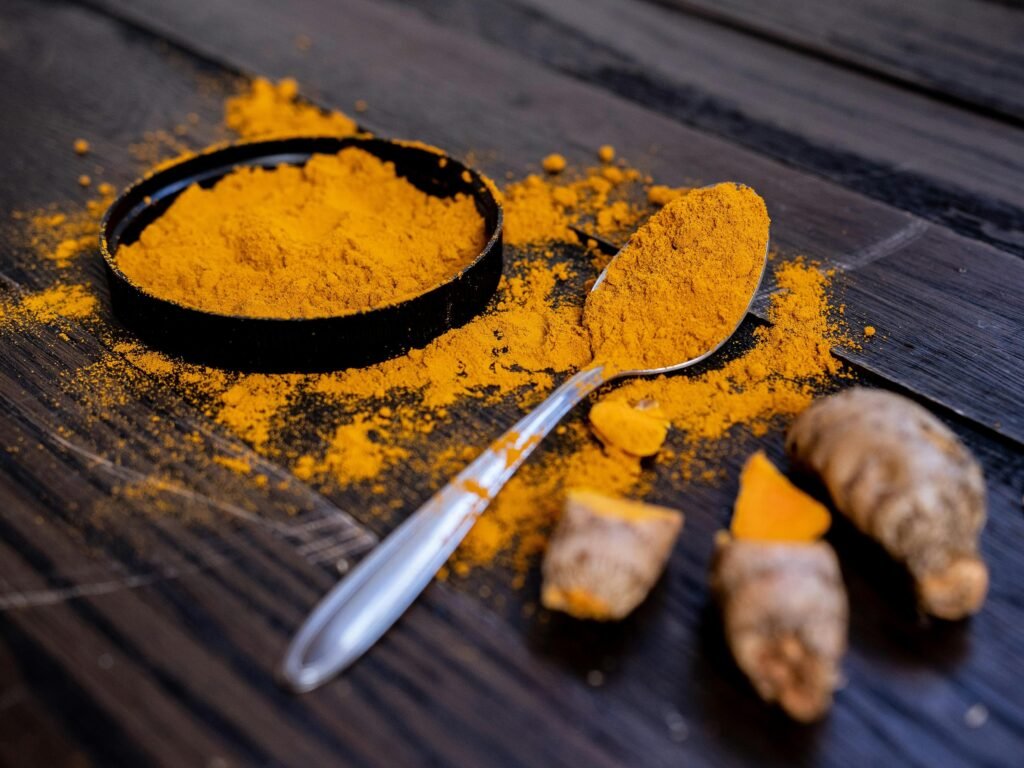Table of Contents
Turmeric, known for its vibrant colour and distinctive flavour, has been celebrated for centuries in traditional medicine and culinary traditions worldwide. Beyond its culinary uses, turmeric boasts a treasure trove of potential health-promoting properties, making it a valuable addition to any well-balanced diet. In this exploration, we’ll delve into the nutritional richness and therapeutic potential of turmeric, uncovering its diverse array of benefits for both body and mind.
From its powerful anti-inflammatory effects to its potential role in supporting heart health, cognitive function, and more, turmeric offers a wealth of reasons to incorporate it into your daily routine. Join us as we embark on a journey to discover the wonders of turmeric and unlock its secrets to optimal health and vitality.
Turmeric, scientifically known as Curcuma longa, has a rich history that spans thousands of years. Originating from the tropical regions of South Asia, particularly India and Indonesia, turmeric has been cultivated and used for culinary, medicinal, and religious purposes for over 4,000 years. It has deep cultural significance in Indian Ayurvedic medicine and traditional Chinese medicine, where it is valued for its therapeutic properties. Turmeric was also highly prized in ancient Hindu rituals and ceremonies, often used as a symbol of purity and prosperity.
Over time, turmeric’s popularity spread across continents, becoming a staple ingredient in cuisines around the world and gaining recognition for its potential health benefits. Today, India remains the largest producer and exporter of turmeric, with spice continuing to play a prominent role in both traditional and modern medicine, as well as in culinary traditions worldwide.
NUTRITIONAL VALUE

Turmeric is not only renowned for its vibrant colour and earthy flavour but also for its impressive nutritional profile. This ancient spice is rich in bioactive compounds, including curcumin, which is responsible for many of its health-promoting properties. Turmeric is a good source of manganese, iron, and vitamin B6, essential nutrients that support overall health and vitality. Additionally, it contains dietary fiber, which aids digestion and promotes gut health.
Turmeric is also known for its potent anti-inflammatory and antioxidant effects, which may help reduce inflammation, neutralize harmful free radicals, and protect against chronic diseases. Incorporating turmeric into your diet, whether by adding it to curries, soups, smoothies, or teas, can provide a flavourful boost while supplying essential nutrients and potential health benefits.
HEALTH BENEFITS

Turmeric is renowned for its impressive array of health benefits, largely attributed to its active compound, curcumin.
POWERFUL ANTI-INFLAMMATORY EFFECTS
Curcumin, the main bioactive compound in turmeric, is a potent anti-inflammatory agent. It inhibits the activity of inflammatory enzymes and mediators, helping to reduce inflammation throughout the body. This makes turmeric particularly beneficial for individuals with inflammatory conditions such as arthritis, inflammatory bowel diseases, and other inflammatory disorders.
ANTIOXIDANT ACTIVITY
Turmeric possesses strong antioxidant properties, which help neutralize harmful free radicals and prevent oxidative damage to cells and tissues. By scavenging free radicals, turmeric may protect against chronic diseases such as heart disease, cancer, and neurodegenerative disorders.
SUPPORTS HEART HEALTH
Turmeric may help support heart health by improving cardiovascular function and reducing the risk factors associated with heart disease. It can help lower LDL (bad) cholesterol levels, inhibit the formation of blood clots, and improve blood vessel function, thereby promoting optimal heart function and circulation.
AIDS DIGESTIVE HEALTH
Turmeric has long been used in traditional medicine to aid digestion and alleviate gastrointestinal discomfort. It helps stimulate the production of bile, which aids in the digestion of fats and may also help reduce symptoms of indigestion, bloating, and gas.
POTENTIAL ANTI-CANCER PROPERTIES
Some studies suggest that turmeric may have anti-cancer properties, thanks to its ability to inhibit the growth and spread of cancer cells, induce apoptosis (cell death) in cancer cells, and prevent the formation of new blood vessels that feed tumors. While more research is needed, turmeric shows promise in cancer prevention and treatment.
SUPPORTS BRAIN HEALTH
Curcumin has been shown to cross the blood-brain barrier and exert neuroprotective effects on the brain. It may help reduce oxidative stress, inflammation, and the accumulation of amyloid plaques, which are associated with neurodegenerative diseases such as Alzheimer’s and Parkinson’s.
JOINT HEALTH AND PAIN RELIEF
Turmeric’s anti-inflammatory properties make it effective in relieving joint pain and stiffness associated with arthritis and other inflammatory joint conditions. It may help reduce swelling, improve mobility, and alleviate discomfort, offering natural relief for those suffering from joint-related issues.
ENHANCES SKIN HEALTH
Turmeric possesses antibacterial and antiseptic properties, making it beneficial for skin health. It can help reduce acne, eczema, and psoriasis flare-ups, promote wound healing, and improve overall skin complexion and radiance.
REGULATES BLOOD SUGAR LEVELS
Some research suggests that turmeric may help regulate blood sugar levels by improving insulin sensitivity, enhancing glucose uptake by cells, and reducing insulin resistance. This makes it potentially beneficial for individuals with diabetes or those at risk of developing the condition.
BOOSTS IMMUNE FUNCTION
Turmeric’s antioxidant, anti-inflammatory, and antimicrobial properties can help strengthen the immune system and enhance its ability to fight off infections and illnesses. Regular consumption of turmeric may help support overall immune function and reduce the risk of infections.
PRECAUTIONS

While turmeric offers numerous health benefits, it’s essential to be aware of potential precautions and drawbacks associated with its consumption:
DIGESTIVE ISSUE
Some individuals may experience gastrointestinal discomfort, including nausea, bloating, gas, or diarrhoea, when consuming turmeric, particularly in large amounts or on an empty stomach. This may be due to turmeric’s ability to stimulate bile production, which can lead to increased stomach acid production and digestive upset in sensitive individuals.
BLOOD-THINNING EFFECTS
Turmeric contains compounds that have blood-thinning properties, which can interfere with blood clotting and increase the risk of bleeding, particularly in individuals taking anticoagulant medications such as warfarin or aspirin. Excessive consumption of turmeric or turmeric supplements may amplify these effects, leading to potential bleeding complications.
INTERACTIONS WITH MEDICATIONS
Turmeric may interact with certain medications, including blood thinners, diabetes medications, stomach acid reducers, and drugs metabolized by the liver. It can interfere with the effectiveness of these medications or exacerbate their side effects. Individuals taking medication should consult with their healthcare provider before using turmeric supplements or significantly increasing turmeric consumption.
KIDNEY STONES
Turmeric contains oxalates, compounds that can contribute to the formation of kidney stones in susceptible individuals. Consuming large amounts of turmeric, especially in supplement form, may increase the risk of developing kidney stones, particularly in individuals with a history of kidney stones or kidney disease.
ALLERGIC REACTIONS
While rare, some individuals may be allergic to turmeric or develop allergic reactions upon exposure. Symptoms of turmeric allergy may include skin rash, itching, swelling, or difficulty breathing. Individuals with known allergies to turmeric or other members of the Zingiberaceae family (such as ginger) should avoid turmeric or use it with caution to prevent allergic reactions.
STAINING
Turmeric has a vibrant yellow-orange colour that can stain clothing, countertops, and utensils. Be cautious when handling turmeric powder or solutions to avoid staining surfaces and fabrics. Additionally, prolonged contact with turmeric may cause temporary skin discolouration, which can be challenging to remove.
PREGNANCY AND BREASTFEEDING
While turmeric is generally considered safe when consumed in moderate amounts as a spice in food, there is limited research on its safety during pregnancy and breastfeeding. Pregnant or breastfeeding women should consult with their healthcare provider before using turmeric supplements or consuming large amounts of turmeric to ensure safety for themselves and their baby.
QUALITY AND PURITY CONCERNS
Some turmeric products, particularly supplements, may be of poor quality or contaminated with impurities, including heavy metals and pesticides. To ensure safety and efficacy, it’s essential to choose high-quality, reputable brands when purchasing turmeric supplements and to follow recommended dosages.
INCORPORATING TURMERIC INTO YOUR DIET

Incorporating turmeric into your diet is both easy and enjoyable, thanks to its versatility and distinctive flavour. Here are several creative and delicious ways to add turmeric to your meals and snacks:
- Golden Milk: Prepare a comforting and nutritious golden milk by heating your choice of milk (dairy or plant-based) with a teaspoon of turmeric powder, a pinch of black pepper (which enhances turmeric absorption), and a dash of sweetener like honey or maple syrup. Enjoy this soothing beverage before bedtime for a relaxing treat.
- Curries and Stews: Turmeric is a staple ingredient in many curry dishes and stews, where it adds vibrant colour and earthy flavour. Incorporate turmeric powder into your favourite curry recipes, whether vegetarian, meat-based, or seafood, for a delicious and aromatic meal.
- Roasted Vegetables: Sprinkle turmeric powder over roasted vegetables before baking to add depth of flavour and a vibrant golden hue. Turmeric pairs particularly well with root vegetables like carrots, sweet potatoes, and parsnips, as well as cauliflower, broccoli, and Brussels sprouts.
- Rice and Grains: Stir turmeric powder into cooked rice, quinoa, or other grains to infuse them with colour and flavour. Turmeric rice makes a flavourful accompaniment to a variety of dishes, from stir-fries to grilled meats and fish.
- Smoothies: Add a teaspoon of turmeric powder to your favourite smoothie recipe for a nutritional boost. Pair it with fruits like pineapple, mango, or banana, along with leafy greens like spinach or kale, and a splash of coconut milk or yoghurt for a refreshing and nutritious drink.
- Eggs: Sprinkle turmeric powder over scrambled eggs or omelettes for a flavourful and colourful twist. Turmeric pairs well with eggs and adds depth of flavour, making for a satisfying and nutritious breakfast or brunch option.
- Soups and Broths: Add turmeric powder to soups, broths, and homemade stocks for added flavour and nutritional benefits. Turmeric enhances the taste of soups and provides anti-inflammatory properties, making it a valuable addition to your favourite soup recipes.
- Salad Dressings: Whisk turmeric powder into homemade salad dressings, along with olive oil, lemon juice or vinegar, and your choice of herbs and spices. Drizzle the dressing over salads or use it as a marinade for grilled vegetables or meats.
- Tea Infusions: Make a turmeric tea infusion by steeping fresh turmeric slices or grated turmeric root in hot water, along with ginger, lemon, and honey for added flavour. Turmeric tea is soothing and refreshing, making it a perfect beverage for any time of day.
- Baked Goods: Experiment with adding turmeric powder to baked goods such as muffins, bread, cookies, and cakes for a unique flavour twist and a vibrant golden colour. Turmeric pairs well with warm spices like cinnamon, ginger, and cardamom in sweet treats.
In conclusion, turmeric stands as a golden treasure in the realm of health and wellness, offering a multitude of benefits for both body and mind. From its potent anti-inflammatory and antioxidant properties to its potential to support heart health, brain function, and digestive wellness, turmeric is a true superfood that deserves a place in every kitchen. Its versatility in culinary applications allows for easy incorporation into a wide variety of dishes, from savoury curries and soups to soothing teas and golden milk.
However, while turmeric holds great promise as a natural remedy, it’s important to use it mindfully and in moderation, particularly for individuals with certain health conditions or those taking medications. By embracing turmeric as part of a balanced diet and healthy lifestyle, you can harness its remarkable benefits and pave the way to a healthier, happier you. Here’s to embracing the golden goodness of turmeric and thriving in wellness and vitality.

